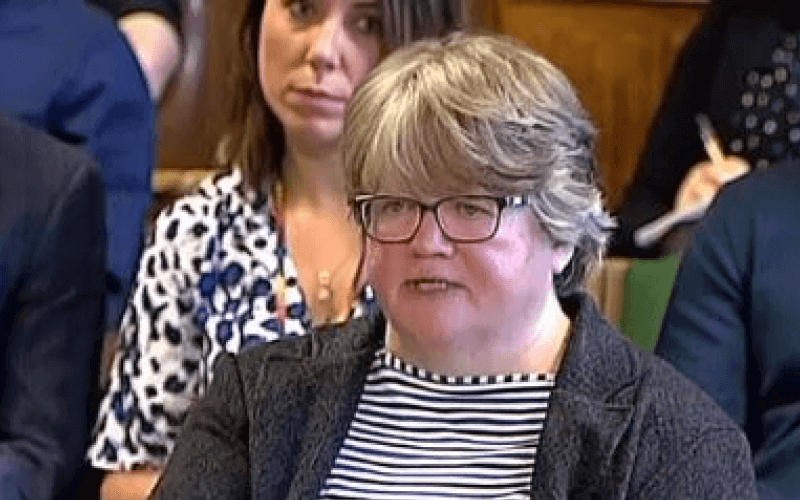Work and pensions secretary Dr Therese Coffey has shown “active contempt for disability rights” by refusing to sign up to her own flagship disability employment scheme, information released by the government has confirmed.
Disability News Service (DNS) has been trying since March to confirm that Coffey is continuing to snub the Disability Confident scheme, despite encouraging employers across the country to sign up to it.
Now a freedom of information (FoI) response from the Department for Work and Pensions (DWP) has confirmed that Coffey is refusing to join Disability Confident.
DNS asked the department in the FoI request whether Coffey (pictured) and 11 other current and former ministers were members of the scheme.
In its FoI response on Friday (3 July), DWP said it did not need to provide the information because it was easily available online.
It pointed to its own website, and a list of Disability Confident members, which had been updated the same day.
That list showed that all four of the MPs who serve as ministers alongside Coffey – Justin Tomlinson, Mims Davies, Will Quince and Guy Opperman – have signed up, although Quince had only done so since DNS first raised concerns in March about current and former ministers turning their back on the scheme.
But Coffey, who has been work and pensions secretary since last September and has been an MP since 2010, is not on the list, even though – like all MPs – she employs staff to assist with her parliamentary duties.
A DWP spokesperson this week refused to comment when asked why Dr Coffey had not signed up to Disability Confident, and whether it showed that she did not value the scheme, and that she did not view the employment of disabled people as important.
Coffey had not commented by noon today (Thursday), although a member of her staff confirmed earlier this year that he and his colleagues were employed by her.
David Gillon, a prominent disabled critic of Disability Confident since its launch in July 2013, said her continued refusal to sign up was “remarkable”.
He said: “Disability Confident is DWP’s flagship policy when it comes to closing the disability employment gap, but that itself is a policy which has been conspicuously sliding in importance for DWP ministers over the past several years as they have failed to make any realistic progress.
“Coffey may have told PoliticsHome that Disability Confident encourages employers to ‘take action’, but it has apparently failed to encourage her.
“And let’s remember, the actions Disability Confident encourages employers to take are in many ways less than the provisions they are legally obliged to make under the Equality Act.
“If Coffey herself can’t be bothered to take that action, even knowing of press interest, then what does that say about the priority given to disability rights within her office? And within DWP as a whole?
“It’s difficult not to construe it as an active contempt for disability rights flowing down from the top.”
Sir Iain Duncan Smith, who launched the scheme when he was work and pensions secretary in 2013, is also among those refusing to join Disability Confident.
He had failed to comment by noon today (Thursday).
Gillon said: “It’s IDS, we know he never considered us anything more than a convenient prop to hang the ‘scrounger’ tag on in the Tory press to justify slashing disability benefits – even the disability benefits that actually made money for the government [like Access to Work].
“Meeting his moral obligations was never a priority.”
Former minister for disabled people Esther McVey, who claims to have created the scheme herself, has finally joined the scheme, months after DNS revealed that she had also neglected to sign up.
Last November, Coffey wrote in PoliticsHome of how the scheme “encourages employers to think differently about disability and to take action to improve how they attract, recruit, retain and develop disabled employees”.
Disability Confident has been heavily-criticised since its introduction in 2013.
Figures secured last year by DNS through a freedom of information request showed that the 13,600 employers that had signed up to the scheme by 13 September 2019 had pledged to provide just 8,763 paid jobs for disabled people between them, an average of just 0.64 jobs per employer.
Members of the scheme include many large employers such as local authorities, government departments, manufacturers, national charities, banks and retailers, including the big four supermarkets, more than 100 NHS trusts, and high street banks.
Three years ago, DWP declared itself a gold-standard employer of disabled people under the scheme – securing the status of “Disability Confident Leader” – just days before being found guilty of “grave and systematic violations” of the UN disability convention.
In March, a BBC Panorama investigation revealed that DWP lost more disability discrimination cases at employment tribunal than any other employer in Britain in the three years after 2016.
A note from the editor:
Please consider making a voluntary financial contribution to support the work of DNS and allow it to continue producing independent, carefully-researched news stories that focus on the lives and rights of disabled people and their user-led organisations.
Please do not contribute if you cannot afford to do so, and please note that DNS is not a charity. It is run and owned by disabled journalist John Pring and has been from its launch in April 2009.
Thank you for anything you can do to support the work of DNS…

 ‘Disastrous’ cuts bill that leaves legacy of distrust and distress ‘must be dropped’
‘Disastrous’ cuts bill that leaves legacy of distrust and distress ‘must be dropped’ Silence from MP sister of Rachel Reeves over suicide linked to PIP flaws, just as government was seeking cuts
Silence from MP sister of Rachel Reeves over suicide linked to PIP flaws, just as government was seeking cuts Disabled activists warn Labour MPs who vote for cuts: ‘The gloves will be off’
Disabled activists warn Labour MPs who vote for cuts: ‘The gloves will be off’